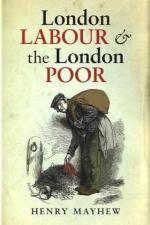
|
| Name: _________________________ | Period: ___________________ |
This test consists of 5 short answer questions, 10 short essay questions, and 1 (of 3) essay topics.
Short Answer Questions
1. Who collected coal, small scraps of wood, lost coins and other junk from the deep, sucking, stinking mud?
2. What is one thing positive Mayhew says about crossing sweeps?
3. Who worked for very low wages in the hopes of finding something to sell?
4. What did some of the bolder boys do?
5. How did many musician patterers support themselves?
Short Essay Questions
1. Where did orphan or runaway coster children live and how did they get money?
2. Who normally held a crossing sweep position and how was that job viewed? How did the crossing sweep have to eat sometimes?
3. How did dustmen and mudlarks help each other?
4. What area of trade did the Jewish traders dominant and what did Ragmen do?
5. How much money did sifters make, what did they do and why did they do it?
6. What were the largest group of London street people and what did they do for a living?
7. How honest were costers' suppliers and how did the costers deal with dishonesty?
8. What was the story Mayhew wrote about a Cheap Jack?
9. Who were generally managers of lodging houses and what happened to a child who did not have the money for lodging?
10. How did some youths work a crossing sweep job and what other ways did they make money?
Essay Topics
Write an essay for ONE of the following topics:
Essay Topic 1
Vagrants were those who loitered in the streets with no work or occupation. Mayhew described them as, "Youths, prostitutes, Irish families and professional beggars." Many were young men between 12 and 20 years old, whom Mayhew described as budding criminals.
1. How does Mayhew's statement about vagrants demonstrate his tendency to generalize groups of people. Use examples from the text and your own life to support your answer.
2. Do you think all vagrants were budding criminals? Why or why not? Use examples from the text and your own life to support your answer.
3. Why do you think Mayhew specifically mentions Irish families in his writing about vagrants and budding criminals? Use examples from the text and your own life to support your answer.
Essay Topic 2
Bolder boys sometimes climbed onto empty coal barges and swept up the leavings of the cargo. This was considered theft, and they were usually chased off by the owners. Sometimes one would be arrested and sent to jail for a week. Like coster children, they regarded a week in relatively warm, safe surroundings with regular meals as a vacation.
1. Do you think the sweepings of coal left behind should be considered theft? Why or why not? Use examples from the text and your own life to support your answer.
2. Discuss what the fact that some children regarded the jail as a vacation says about the coster children's lives. Use examples from the text and your own life to support your answer.
3. Discuss ways in which you see coster children as being abused in general in this era in London. Use examples from the text and your own life to support your answer.
Essay Topic 3
The London City Mission was a group of missionaries of various denominations paid to go door-to-door and read scripture, try to convert residents to Christianity and to encourage residents, especially the poor, to attend church. From 1.8 million home visits 307 poor people attending church for the first time, 3,500 being baptized and 48 persons who were living in sin deciding to marry their partners.
1. Do you think the results the London City Mission had was very poor considering the number of home visits that were done? Why or why not? Use examples from the text and your own life to support your answer.
2. What do you think the results of the London City Mission indicates about the poor in London at this time? Discuss the reasons in depth. Use examples from the text and your own life to support your answer.
3. Given the amount of time, work hours and effort the London City Mission put into their efforts what do you think they could have done for the poor of London with the same resources that might have helped the people? Do you think they should have done that? Why or why not? Use examples from the text and your own life to support your answer.
|
This section contains 1,380 words (approx. 5 pages at 300 words per page) |

|




